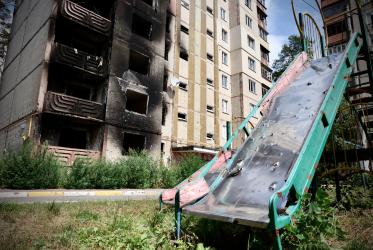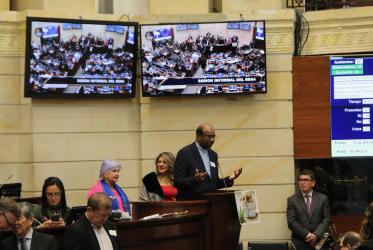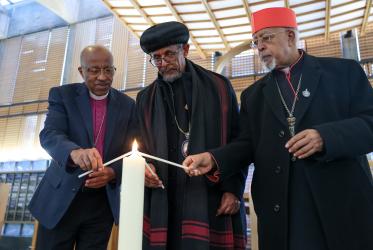Free photos available: see below
The Rev. Dr Samuel Kobia took up the position of general secretary of the World Council of Churches (WCC) at the beginning of 2004. On the occasion of completing his first 100 days in office he gave the following interview to the WCC Public Information Team. In it Kobia speaks about his daily work and his first actions as general secretary, the challenges facing the ecumenical movement at the beginning of the 21st century, the role and priorities of the WCC, and his dreams and vision for the Council. (This material can be freely reproduced. Free high resolution photos are available, see below.)
It is already 100 days since you took up office as general secretary of the World Council of Churches. Were there any surprises when you started?
Of course I am not new to the WCC or even to the General Secretariat, because I have been part of the staff leadership of the organization for many years, but I must say that it is not until you actually sit where I am sitting now that you appreciate all the dimensions of this office. One of the things that surprised me was the amount of work to be done each day by the general secretary. For example, the volume of mail and e-mail that our rich network of relationships produces every day is incredible. Then, there are the demands on my time from people outside who see us as valid partners. Besides other international organizations, our member churches and our constituency, there are so many others out there in the general public who come here or who seek an appointment – far more than I expected.
Looking back, what have been some of your first actions since you took up office?
I attach a very great importance to relationships. An organization is as good as its relationships, especially with its constituency. Seeing the WCC's governing bodies both as the direct representatives of the fellowship of churches and my principal source of advice and counsel, I began by addressing a personal letter to each member of our central committee. Next, in order to improve our relationships with our ecumenical funding partners, I welcomed a meeting with our closest donors and agencies. And then, convinced that the way the general secretary relates to his staff is very important, I have tried to make myself available, to listen to and meet with staff colleagues during these first 100 days.
In early March, I travelled to Washington to attend a meeting of the churches in the USA in order to reinforce our relationship with this part of our membership, taking into account that the 2004 focus of the Decade to Overcome Violence is on the USA. A highlight of that trip was a meeting with the leaders of the historic black churches which are members of WCC – the first such meeting between a WCC general secretary and the leaders of these churches.
Also in early March a visit to Antelias, Lebanon to meet with our central committee moderator, HH Catholicos Aram I, and representatives of the Roman Catholic Church allowed me to affirm that relations between the WCC and the Roman Catholic Church will continue to deepen.
How would you assess the current state of the ecumenical movement, and what would you identify as some of the major challenges at this time?
It is clear that in the last ten years, the WCC has sought to address the fundamental questions facing the ecumenical movement through studies like the “Common Understanding and Vision of the WCC”, which emphasized the fellowship dimension of the Council, and the need to both deepen and broaden the fellowship of churches. The Special Commission on Orthodox participation in WCC was a similarly important process, followed more recently by the start of a new discussion on the reconfiguration of the ecumenical movement. These are all important indicators of the desire and need to re-assess the ecumenical movement today.
I think that the time has come to really look again at the ecumenical movement today. I believe that it is facing an unprecedented challenge. The situation in which the WCC was born and the realities that continued to sustain the Council in terms of our mission, objectives and cause, are now behind us in many ways. We are confronted with an altogether new situation. The classical forms of ecumenical learning are changing. The student Christian movements and lay academies which are the traditional vectors of ecumenical formation seem to be struggling to survive in many places. Bilateral ecumenism is growing. Some Pentecostals and Evangelicals now see themselves as working ecumenically because they bring people from several denominations to work together, for instance in para-church organizations. And the emergence of non-denominational congregations is also a new reality. So, in a nutshell I would say that on both the global and local levels, the ecumenical movement is confronted with a changed reality that requires us to re-evaluate and to see how we move forward. I do feel that current forms of the institutional ecumenical movement may no longer be properly adapted to our needs.
Another challenge relates to the Protestant churches. Historically, mainline Protestantism, particularly in Europe, has played a pivotal role in the ecumenical movement and has given much to both the thinking and the forms of the ecumenical movement and to the WCC. Now, while Protestant churches in Europe will continue to play a significant role in the ecumenical movement, they seem to be losing part of their status and influence in society. On the other hand, I am encouraged to see that the spirit of ecumenism lives on across the spectrum of the member churches of the WCC, both Protestant and Orthodox, in all regions. We have seen a renewed interest from other parts of the Christian world which traditionally were not integrated into the ecumenical movement. These latter trends give me hope. So, it is a time of change, a time of anxiety for some, and I would like to see if the search for a reconfiguration of the ecumenical movement gives us sufficient room to address these issues, or whether we need to find new ways to approach them as we move into the 21st century.
You have mentioned relations with the Roman Catholic Church and the role of the Orthodox churches. How do you assess their contributions to the ecumenical movement of the 21st century?
The work since 1999 of the Special Commission on Orthodox Participation in the WCC shows that the Orthodox churches wanted to confirm their commitment to the ecumenical vision. When they saw that there was something to change, or with which they disagreed, their reaction was not to move out but rather to engage and to change while remaining in the ecumenical family. I also saw that WCC member churches, having been challenged by the Orthodox, were ready to discuss issues central to the fellowship that is the WCC among themselves, and not just to fulfil the constitutional requirements or attend meetings.
The Special Commission has also brought the potential for an unprecedented change of institutional culture in the WCC, particularly through its proposal of a consensus model that is being gradually introduced. This could effect a remarkable and positive change in the way we work together, and it gives us a formula for dealing with divisive issues and problems in the future.
It is also important to look at our relations with the Roman Catholic Church. When I met in Antelias with the president of the Pontifical Council for Christian Unity, Cardinal Walter Kasper, we talked about how to strengthen our work together, particularly where we have a framework like the Joint Working Group between the WCC and the Roman Catholic Church. Membership is not what is most critical here, but rather the deepening of our collaboration. A renewed commitment must be given to the visible unity of the churches. The Faith and Order Commission and the Joint Working Group are very important because they offer possibilities for the involvement of the Roman Catholic Church in the life and work of the WCC. I am also encouraged by a growing number of collaborative efforts in the area of migration, health and healing, without forgetting longstanding relations in the area of inter-religious dialogue.
How would you define the unique role and contribution of the WCC in this complex and evolving context?
The WCC is one of a kind, and its uniqueness lies in its special role as a global multilateral “space” that brings together an extraordinary cross-section of histories, cultures and theologies to encounter each other in a way that no other organization does. There is unique richness in the WCC, and we need to find ways to make the best use of this treasure. The diversity that we have here should be seen not as an obstacle, but as a rich resource that needs to be put at the service of all.
What vision do you have for the WCC in the coming period, as we look forward to the ninth assembly in 2006 and to the 60th anniversary of the organization in 2008?
One of the discoveries I have made meeting with organizations and people over the years is that they expect the WCC to be a global moral voice for its constituency and for the world as a whole. I would like the WCC as a movement and as an institution to offer moral guidance when faced with the crucial issues of the world. I am convinced that the questions confronting the world today are of a fundamentally spiritual nature. Despite the remarkable technological and scientific progress in many areas, when it comes to human relations, the challenges are profound.
In Africa, when people reach 60, they are considered sufficiently wise to advise the community and family on important issues. I hope that the WCC at 60 can offer that kind of service, and allow others to look at us as a fellowship that helps others to move forward and respond to challenges.
What priorities do you see for WCC in the coming period?
Our work today must be under-girded by spirituality. Whatever it is we do, from diakonia to justice and peace work or interreligious dialogue, we must attempt to discover how spirituality can underpin and provide a foundation for it. In this respect, the Orthodox Church, as a part of the ecumenical movement with centuries of living spirituality, is important. The ecumenical movement can benefit tremendously from its gifts.
Looking back, I could say that the decision of the WCC to proclaim a Decade to Overcome Violence was truly inspired by the Holy Spirit. I believe that violence in all its forms is really what threatens to tear humanity apart. Insecurity in our homes, in our communities, cities and world is people's biggest anxiety. The brokenness of the world today is really a reflection of how much human beings are losing their capacity to relate to each other as good neighbours. The churches and the WCC can make a significant contribution towards overcoming violence at all levels, and the Decade to Overcome Violence provides us with a framework to move towards this end.
Compared to what many people expected 50 years ago, religion at the start of the 21st century has returned to the public sphere. Religion is seen as having a central place in society, and remains a strong source of identity for many people in many places. Therefore, dialogue between religions is even more essential so that identity differences do not become a source of conflict or a “clash of civilizations”, but a source of peace. In addition to that, religious plurality itself challenges us in many ways: How can we reflect and work together on issues of common concern? How do we as Christians understand ourselves and Christian education in the light of religious plurality? Those are truly key priorities for the churches as well as for the WCC.
Ecumenical education and formation is also an area that needs particular attention. Much emphasis and resources should be given to young people in particular, but people of all generations need to re-engage with the ecumenical movement in new ways.
And of course, at all times, the search for visible unity of the churches must remain a top priority for the Council. The broadening of the fellowship remains especially important in this context. We need to stress again that the aim of visible unity of the churches holds a central place in the life of the WCC.
In what ways do you see a strengthened role for women and youth in the ecumenical movement?
I was deeply inspired by the recent visit to the WCC of a delegation of young people from Denmark. I think we need to use our institutional and programmatic frameworks, including the Ecumenical Institute at Bossey, to broaden the engagement and involvement of young people in the life of WCC. New technologies may allow creative ways of enabling this. I would also like to use the WCC’s ninth assembly in 2006, both its preparation and the event itself, as an opportunity to enable the involvement of many hundreds of young people, strengthening the opportunities for ecumenical formation and commitment beyond the 700 official delegates. Similarly, I would like to extend this opportunity to women, who are also traditionally marginalized in church and society. The assembly provides an occasion for special attention to women, and a significant time during which they can assume their rightful place in the ecumenical movement.
It is essential to recognize that women are the particular victims of violence in our world today, in which conflict and war increasingly target civilian populations. In Africa, the tragic conflicts of recent years tell me that something has really gone wrong in our societies. Sacred limits have been infringed when women and children are victims. Once again, the Decade to Overcome Violence offers us a framework to address some of these issues, and to mobilize our churches, movements and groups to reach out to women, to children and to young people today.
What message from the WCC would you like to emphasize today?
It is clearer and clearer to me that what the world and humanity needs today are bridges that connect and bring people together. Everywhere, we see that people and relationships are broken. Despite the fact that we live in an age of international travel and mass migration, very often the stranger is still not welcome in many places. Our task is to help people to rediscover the humanity of others and the fundamental value of human relationships. I would like the WCC to be both a bridge builder and a bridge itself, connecting humanity and allowing people to relate to each other again.
Free high-resolution photos to accompany this interview are available at:





